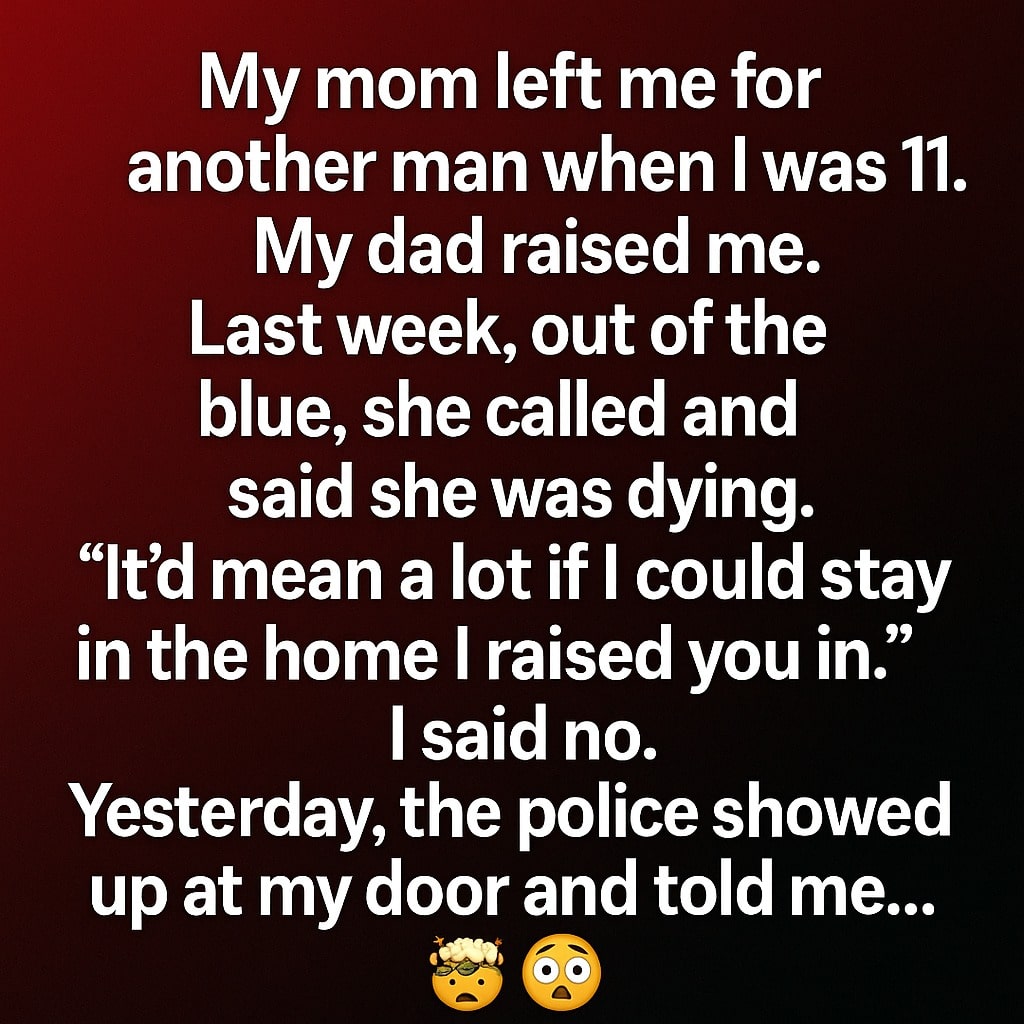My mother left when I was eleven. No big scene, no shouting—just a quiet shudder through our house that never fully stopped. Afterward, it was my dad and me. He wasn’t perfect. He burned dinner, mismatched socks, and bought the wrong shampoo more than once. But he was steady. He showed up at every parent-teacher conference, sat on the cold metal bleachers at every game, and kept the lights on even when I could tell the bills were heavy in his hands. On nights when I had more questions than answers about why she left, he didn’t pretend to know. He just listened, then said, “I’m here,” like a promise he intended to keep.
Last week, the past rang my phone. Her voice was thinner than I remembered, like a photograph left too long in the sun. She told me she was very sick. She asked if she could come back. “It would mean a lot if I could stay in the home I raised you in,” she said. The words caught on something inside me. She hadn’t raised me—not really. The man who worked double shifts had. The man who learned to braid my hair—crooked, too tight, then gentler—had. The man who learned the difference between being tired and being needed had. I told her no. I tried to be kind, but I said what was true: that house was not hers anymore. It hadn’t been for a long time.
Yesterday, the police knocked. They were respectful, careful with their voices, the way people are when they’re about to hand you a fragile thing. She had passed away. I stood in the doorway with my hand on the frame and felt the world rearrange itself by a hair—so subtly that if you blinked you might miss it. It wasn’t shock; I’d lost her years earlier. It was the heaviness of finality. No more “maybe someday.” No last conversation that could untangle the old knots. No different words. Just the silence of a door that would never open again.
That night I sat with my dad at the kitchen table he’d refinished the summer I turned thirteen. We didn’t say much. He slid a mug toward me—too sweet, just the way I always complained about and always drank anyway. Outside, a siren drifted somewhere far away, the refrigerator hummed, and our house did what it had always done: held. I stared at the grain in the wood and thought about how love doesn’t always arrive dressed like a miracle. Sometimes it shows up in small, stubborn ways—punctual, repetitive, unremarkable to anyone else. A ride at 6 a.m. to practice. A sandwich wrapped in foil with the crusts cut off. A hand reaching for a tangled necklace and saying, “Let me try.”
I kept turning over her request in my head—the home I raised you in. I realized that a building remembers who cared for it. The paint remembers who taped the edges and who rushed the job. The floorboards remember which footsteps stayed late and which faded at the door. In our house, everything I leaned on had my father’s fingerprints: the patched drywall, the winter blanket pulled from the top shelf, the emergency twenty tucked behind the sugar. He was the one who made it safe, who laughed in the doorway when I stomped off as a teenager, who knocked before entering my room because he knew respect grows people. If home is a story we live inside, he’s the one who kept writing when the plot got hard.
Grief can be complicated even when love is not. I felt a sadness for what never happened, for the version of us that could have been and wasn’t. But under that, like bedrock, was something solid: gratitude. My dad, imperfect and unwavering, had built a life where I could fall apart and still be caught. If there’s a lesson at the end of all of this, it isn’t about blood alone; it’s about presence. Family is not only the people who gave us life but the ones who give us love, who shoulder the ordinary in a thousand unglamorous ways, who stay. In the end, the home she wanted to return to had always been his—because he is the one who made it a home at all.
